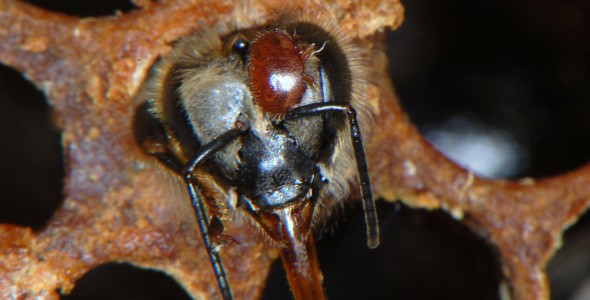Vita helps fund new research to halt honey bee killer
A major investment from public and private sector organisations is helping scientists to develop completely new ways of tackling the biggest killer of honey bees worldwide – the bloodsucking Varroa mite.
Researchers from the University of Aberdeen and the National Bee Unit, part of the Food and Environment Research Agency, have worked out how to ‘knock down’ genes in the parasitic mite causing it to die.
So far the work has only been done in the lab but now the team can take their work a step closer towards developing a product that could help beekeepers thanks to funding worth over a quarter of a million pounds from Biotechnological and Biological Sciences Research Council (BBSRC) and Vita (Europe) Ltd.
Dr Alan Bowman, who is heading up the research, said: “Honey bees are incredibly important because of their pollination of flowers of both wild and farmed plants.
“But their numbers are seriously declining year on year and while there are probably several reasons for this, one of the most important factors is Varroa destructor that sucks the blood from bees and transmits serious viral diseases.”
“There is an urgent need to develop a Varroa-specific, environmentally friendly treatment or some method of overcoming the Varroa’s resistance mechanism to existing treatments and that’s what we are now working towards.”
Dr Max Watkins, Technical Director of Vita (Europe) Ltd, a major funder of the research, said: “Finding treatments that kill varroa mites, but don’t harm honeybees, bee products or the environment is not easy. The challenge is heightened because the relatively short life cycle of the varroa mite means that resistance to a single treatment can often develop quite quickly unless beekeepers alternate treatments of different types. Vita is therefore supporting this exciting and innovative research and hopes that an effective and environmentally sensitive treatment can eventually be developed at a cost that is affordable to beekeepers across the globe.”
Dr Giles Budge, from the National Bee Unit at Fera added “We are delighted to be in a position to progress this research, playing our part facilitating the translation of science from brilliant academics at Aberdeen to a company like Vita which has an established record of research, development and marketing of new honey bee health products. It is particularly exciting to see our work move from the bench into products which could become commercially available to help beekeepers.”
Researchers will create and scour databases of all the Varroa genes in a bid to identify the ones that can be effectively and safely targeted by potential new treatments.
Dr Bowman added: “We rely on honey bees to pollinate our crops and add variety to our diets, which is why there is a real need to tackle the problem of their decline. Having proved our concept in the lab we are delighted that this funding will allow us to develop our research to have real-world impact.”
Notes to Editors
More about the research
Led by Dr Alan Bowman, the research team will be using modern molecular techniques to investigate gene silencing and the identification of suitable target genes in the varroa mite.
In a 2010 peer-reviewed academic paper, Dr Bowman produced the first report of successful ‘knock-down’ of genes in a mite species, specifically varroa, through RNA interference (RNAi), a gene silencing technique. This technique had previously been shown to be successful with invertebrates by injecting small interfering double-stranded RNA (dsRNA) molecules. Bowman showed that the small size of varroa need not pose insurmountable problems and found that immersion in dsRNA solution could produce results relatively easily, quickly and inexpensively.
With the technique proven successfully in the laboratory, the challenge of the current research is to find the most relevant and susceptible genes to be targeted and in the longer term to develop a suitable affordable treatment for use by beekeepers.
The first stage of the new work is to use “Next Generation Sequencing” to identify and describe all the genes of Varroa destructor. From hundreds of millions of pieces of gene sequencing information, the team will search for the Achilles’ heel of the varroa mite, and check that targeting it will not affect the bees or indeed any other animal species.
Once vulnerable genes of the varroa mite have been identified, the search will then focus on producing a treatment to target that gene. Laboratory and field trials will then thoroughly test the efficacy and safety of potential treatments.
Beekeepers across the UK will be encouraged to register to send varroa mites to Dr Bowman. They should email with their name, and address. Packaging will be supplied and postage costs will be paid.
About Vita (Europe) Ltd
Vita (Europe) Limited is a mite control and honeybee health specialist. It is the world’s largest dedicated supplier of honeybee health products to the honey and pollination industries. With headquarters in the UK, offices in Italy, France and Russia, and partners across the globe, Vita researches, develops, and manufactures a range of honeybee health products. These products are marketed internationally through a network of 60 distributors in 50 countries.
About BBSRC
BBSRC invests in world-class bioscience research and training on behalf of the UK public. Our aim is to further scientific knowledge, to promote economic growth, wealth and job creation and to improve quality of life in the UK and beyond. Funded by Government, and with an annual budget of around £445M, we support research and training in universities and strategically funded institutes. BBSRC research and the people we fund are helping society to meet major challenges, including food security, green energy and healthier, longer lives. Our investments underpin important UK economic sectors, such as farming, food, industrial biotechnology and pharmaceuticals. For more information about BBSRC, our science and our impact see: www.bbsrc.ac.uk. For more information about BBSRC strategically funded institutes see: www.bbsrc.ac.uk/institutes.
Media Enquiries
Stephen Fleming at Palam Communications
Tel +44 (0) 1635 299116


